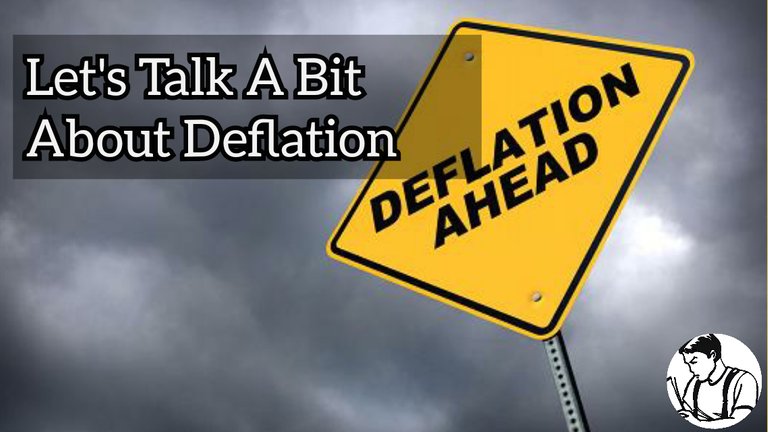Let's Talk A Bit About Deflation

Inflation is a trending topic these days. Everyone is talking about it and its effects. Likewise, almost everyone is feeling its effects. It’s a current global phenomenon that’s attributed to different factors. How is it being solved? Mainly through lowering interest rates? I think there are more efficient ways to tackle the inflation problem. Technology is deflationary by the way and it’s greatly entangled with the economy.
What Is Deflation?
Deflation is a term that refers to a decrease in the overall level of prices. It's often used interchangeably with "price deflation." It's the opposite of inflation, which we'll talk about later on in this article.As prices fall, consumers have more money available to spend on goods and services. Deflation also gives businesses an opportunity to lower costs and invest in productivity growth, thus increasing their competitiveness in the global economy.
Inflation occurs when there's an increase in the general price level—the price of all goods and services goes up over time. This can happen because more money is circulating through the economy or because interest rates are rising, making it harder for businesses to make loans and people to borrow money at reasonable rates (because they're paying higher interest).
What's The Difference Between Inflation And Deflation?
Inflation and deflation are two sides of the same coin. They are both types of economic growth that happen when prices increase over time, but they have different effects on the economy.Inflation is when the price of goods and services rises. Deflation is when the price of goods and services falls. Inflation is an increase in the general level of prices, while deflation is a decrease in them.
Deflation starts to occur when there's too much money in circulation; this causes people to hold onto their money because they don't want it anymore (in other words: they don't spend it). It also happens when there's not enough demand for goods and services (which we’re currently experiencing); therefore, businesses aren't able to sell as much so their prices stay stable or go down—which means we're not buying as much stuff any more either.
However, if you have too much money circulating around (i.e., if you're printing more than you need), then your currency becomes devalued over time—it loses value against other currencies like gold or silver coins—which means that buying something with your dollar will now cost more than before because there are fewer dollars available for exchange into those other forms at any given moment.
How Can You Spot A Deflation?
There are several ways to spot deflation. Prices are falling, wages are falling, people are saving more and holding onto ‘cash’ rather than spending it. This is because they're holding onto their assets instead of spending them or buying goods and services.People are also paying down debts or delaying purchases until prices fall further. If you see this happening anywhere — even if it's only affecting a small percentage of people — then there's probably some level of deflation occurring at that time.
A deflation can be caused by a decrease in collective demand, an increase in aggregate supply (e.g. 2020 pandemic after shock), or a combination of both.
An Example Of A Past Deflation
*Japan in the 1990s. After World War II ended, Japan had high levels of unemployment and inflation due to an influx of capital from overseas markets which they were unable to meet domestically (this was often referred to as “capitalism without capitalists”).As a result, they adopted strict monetary policies that prevented any additional money from entering circulation until 1996 when they loosened their control over interest rates again—this time only allowing banks more access to capital so that they could issue loans at higher interest rates than before.
In Conclusion
If you're wondering whether or not our economy is currently experiencing deflation, the answer is probably yes. Although inflation is what’s seen on the surface, when you look deeper or beyond the surface, you’ll find a deflation happening.For example, take the retail stores and all the inventory they’re stuck with. People are not buying anything apart from the essentials. They’ll have to eventually reduce the prices (probably gradually) if they really want to get rid of their inventory.
*Source: https://www.ecosbsc.com/debt-deflation
Thanks For Reading!
Follow: Young Kedar
Recent Posts;
● The Opportunity That Comes With Economic Upheavals
● Should One Adopt A Frugal Lifestyle When Trying To Build Wealth?
● Chasing After The Long Tail Of The Market
● Collaboration Versus Coordination In A Tech Driven World
● How Personal Finance Gives You An Edge In The Modern World
Dolphin Support : @cryptothesis
Posted Using LeoFinance Beta

People are conditioned to believe inflation bad, deflation good. Unfortunately, under the latter there is no economic expansion which means people end up losing their jobs.
The lowering in prices is of not benefit if one's income falls through the floor due to layoffs.
Posted Using LeoFinance Beta
Yes indeed! The ideal would be to balance between the two. Both of them have positive and negative aspects.
True and it potentially also increases the problem of debt. As it makes debt more difficult to pay back over time.
Posted via